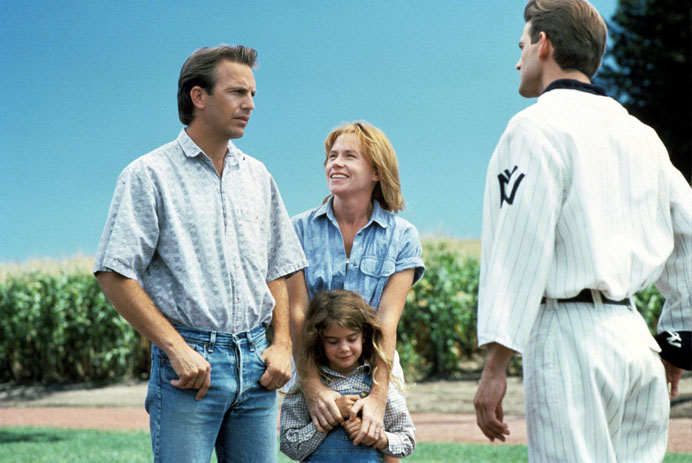
Field of Dreams. The undisputed king, for sure. But here’s ten other great ones.
It was a really tricky thing putting this together because they’re ranked on niceness, not goodness. Number two and number five are the best movies on the list. But they aren’t the nicest.
Niceness is even harder to define than coolness. Niceness is a warm and fuzzy feeling that a lot of art can generate. Probably the most popular example would be Norman Rockwell paintings. Niceness, like coolness, taps into our primal brains somewhere. We’re wired to feel it because it connects us to each other. But the problem with niceness is that it borders so heavily on cheese. Cheese done right is transcendent. But cheese done wrong is, well, cheesy.
While coolness is fairly easy to define technically, niceness is much harder because it’s not based in visuals, or any other surface aspect. Niceness comes from the story, the way it ebbs and flows. The way the characters relate to each other. It certainly helps if your visual style is masterful and grounded, but since that’s true for all movies, it’s not niceness-specific.
Most movies have nice moments, because stories need emotional peaks and valleys to sustain interest. The peaks will generally be nice, like when the couple finally kisses or when the boy and his family are finally reunited. Those are certainly nice things, but what I searched for while making this list is movies whose entirety feels nice. They all have their dark moments (the happy times wouldn’t work without them) but these movies create an overall tone of niceness that is pervasive.
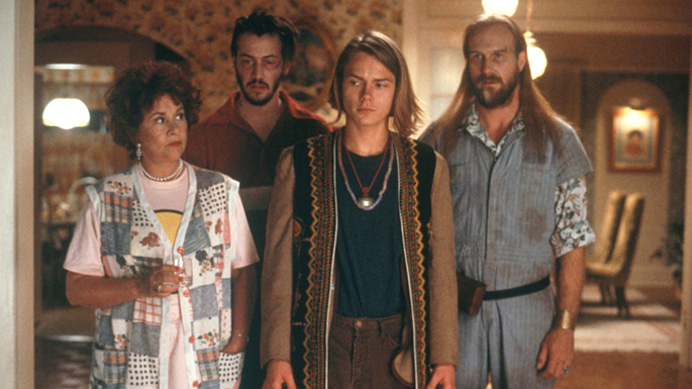
10. I Love You To Death (1990) | Dir. Lawrence Kasdan | 96 min.
Larry Kasdan is one of the most impressive screenwriters in movie history, penning both The Empire Strikes Back and Raiders of the Lost Ark. His sons aren’t slouches either—Jake’s directorial debut was the charming Zero Effect, which was followed by work on Freaks and Geeks, and the underrated Orange County. Jake’s younger brother Jon helmed the small but affectionate and watchable In the Land of Women and was also a writer on Freaks and Geeks at only 20.
Larry’s filmography is a bit hit-or-miss, with hugely overrated clunkers like Body Heat and The Accidental Tourist. But he’s also the man behind The Big Chill and French Kiss, two other ‘nicers’.
I Love You To Death’s casting is terrific: a light-hearted Kevin Kline that you like despite his character being a sleazy scoundrel, a quaint River Phoenix, the prolific Joan Plowright, and of course the ever likable Tracy Ullman, whose entire aura is like a likability tractor beam.
The score is delightful, the hijinks terrific, and the tone is, well, nice—despite the film being about adultery and murder!

9. House II: The Second Story (1987) | Dir. Ethan Wiley | 88 min.
This easily could’ve made my ten best movies you’ve never seen list, but its niceness actually tops its obscurity. As you may have guessed, this is a sequel to House, a Bill Katt vehicle directed by Steve Miner in 1986. House II doesn’t have much to do with House, and is a very bizarre and delightful comedy that’s extremely effective and fun.
The entire cast is phenomenal and any movie that features a fake band called ‘Puce Glitz and the Avoiders’ is okay in my book. Keep an eye out for John Ratzenberger stealing the movie in what, in a perfect world, would be be a well-known, iconic scene, and a terrific Royal Dano jerking your tears in the movie’s finale.
The niceness here lies in the crazy web of zany nuttiness, glued together by straight man Arye Gross, and comically illuminated by Jonathan Stark (a TV writer for Ellen, The Drew Carey Show, and Cheers).
The niceness epicenter lies in the charming dinner scene where a “caterpuppy” becomes a member of the family. They don’t make ‘em like this anymore.

8. Elizabethtown (2005) | Dir. Cameron Crowe | 123 min.
Cameron Crowe is one of the greatest purveyors of cinematic nice. His movies are so nice you don’t even notice how angular and edgy they actually are. For Jerry Maguire, Crowe teamed with James L. Brooks, the father of nice, and looked to Billy Wilder for inspiration, who along with Frank Capra is the grandfather of nice. Billy Wilder was even supposed to play Dicky Fox (a role that went to actual agent Jared Jussim) the lawyer who drops tidbits to the camera throughout the movie. Wilder didn’t want the role, but then after seeing the movie and loving it he said, “who’s the guy playing my part!?”
Jerry Maguire is so oozing with nice that it out-niced itself for this list. It’s beyond number one. But as I said, the funny thing is, Jerry Maguire is actually a pretty in-your-face movie with the spirit of an indie. It’s littered with fast paced jokes, outlandish performances, jagged editing, and brilliant photography (some amazing wide angle stuff) by Janusz Kaminski.
It gets picked on because of Tom Cruise, and for having four of the cheesiest lines in movie history: “show me the money”, “help me help you”, “you had me at hello” and “you complete me”. (Hard to believe a single movie can have four famous lines!) These lines incidentally totally work in the movie and are a perfect example of how to do cheese right. Basically, Jerry Maguire is one of the most brilliant screenplays ever written and one of the best movies ever made.
Elizabethtown isn’t quite as good, but it’s not too far off. I’ll take out the trash first: Orlando Bloom is not bad in the movie, but his accent is, and what’s worse, he’s the fucking narrator. Don’t do that. The opening ten minutes is rough. It’s one of those unfortunate movies where you have to wait until the inciting incident for it to be good. Once it finally starts, it never lets up, but the beginning is brutal. Miscalculated jokes and awkward dialogue are the pitfalls.
Now the good: Elizabethtown’s first foray into niceness comes in the form of a phone sequence that is the best depiction of a budding romance in movie history. You know when you meet someone and you begin flirting and talking and then you have that one long conversation that solidifies your connection? That’s the scene, and it’s perfect. I think those scenes are missing from movies because they’re difficult to handle. In life, these conversations are, by definition, hours long. Somehow, Elizabethtown dodges all the laser beams and truncates the conversation perfectly, delivering all the necessary beats, giving you the feeling of time, but not being boring.
And then the entire third act is nice city. Enough said. Go watch it.

7. Parenthood (1989) | Dir. Ron Howard | 124 min.
Depicting family dynamics in a movie is damn near impossible. Family dynamic exists based on familiarity that has been forged, literally, out of time. You have lived with these people your whole life, you know them, and your household is full of minutia that creates your life. Movies have to be stories, they have to move forward, so that minutia must be a part of that forward momentum. The tightrope you walk is trying to create an organic family that clearly has a rich history, but not belaboring things so that we’re just looking at hidden camera footage of people sitting around together. But you can see the difficulty here: how do you both create familiarity, which demands time, and also keep forward momentum? The answer really lies in the movie Signs, where all of these ideas converge. Every piece of information in Signs is character-building and story-developing at the same time. It allows the movie to move forward while feeling like it’s hanging out.
The master of this is Spielberg, who is the best director of all time at depicting family dynamics. Jaws, Close Encounters, and E.T. all have the best families-hanging-out-in-their-homes scenes of all time. The reason is because each has a well-defined story that doesn’t linger, but instead, create themselves as they flow. The scene in Poltergeist where the parents smoke weed together (which I like to think inspired the similar scene in Eyes Wide Shut) is one of the most realistic scenes in movie history for a plethora of reasons. One, the actors look like people—still attractive, but people. Movies today are obsessed with unrealistic looking models populating all roles. Every wife is a young, gorgeous, size two. JoBeth Williams is pretty, but not insanely untouchable; it seems plausible that these two would get together. Two, their performances and the unobtrusive staging puts you right in the room.
This long winded explanation leads me to Parenthood, which is an entire movie built out of those scenes. The families feel real because they aren’t constructed out of dumb, faux-grittiness like in Thirteen, or flat nothingness like on a sitcom. They have earnest, relatable problems, handled with care by a team of filmmakers who were living through them.
Parenthood tackles all kinds of parent/offspring relationships and weaves them together perfectly. Since there’s no missteps, the entire piece feels cohesive and the niceness flows throughout—like the roots in a family tree!
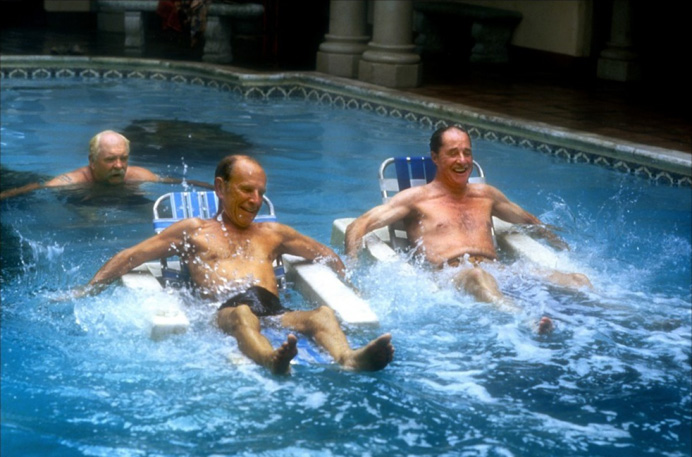
6. Cocoon (1985) | Dir. Ron Howard | 117 min.
Look at Opie coming through with two in a row! Parenthood is actually a better movie, but old people with boners always trump teenagers with boners, and the Wilford Brimley fishing scene is nice enough to out-nice all of Parenthood (yes, even Rick Moranis crooning to his wife in a elementary school classroom).
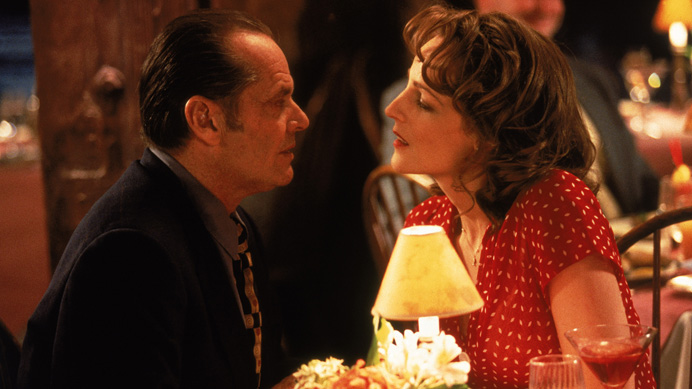
5. As Good As It Gets (1997) | Dir. James L. Brooks | 139 min.
This movie is like a winding road to nice, at times literally, such as when the characters take a dramatically fruitful road trip towards the beginning of the third act. Maybe it’s ironic that a movie about an incorrigible, obsessive-compulsive dickhead is one of the nicest ever made. But, if you’ve been following along, you know that niceness can come from surprising places.
As Good As it Gets is the only romantic comedy ever made where we’re left knowing our lovers won’t walk away into the utopian sunset. Hell, they’ve probably broken up before the credits stopped scrolling. But it’s in the honesty that designed that result that the niceness lies; the niceness here can be found in the true human interactions, the true human performances, and the true human writing and direction by the father of nice, James L. Brooks.
He’s a prolific TV producer responsible for a litany of nice, from The Mary Tyler Moore Show to the most touching moments on The Simpsons (one of the most shockingly nice shows on TV). There is nobody else with a tone like James L Brooks—so rich and layered, so intricate and intimate. Terms of Endearment, Broadcast News, and As Good As It Gets are not only three of the best movies ever made, but three of the most complex dramas in the history of the form (and three of the nicest experiences of all time). Whether it be the horrors of cancer, the media, or interpersonal relationships, Brooks’s camera finds the nice inside and creates a tone that is so beautiful, living inside it would be a true taste of heaven.
As Good As it Gets really is just that as far as movies go. And lets take a moment to give props to Greg Kinnear’s agent, for apparently being the best of agent of all time by transforming him from Talk Soup host to Oscar-nominated all-star in one year.
Side Note: I saw As Good As it Gets in the theater with my Mom when I was ten. I felt like an adult (and you remember how important that was as a kid) for genuinely liking it in a theater full of thirty-somethings. Then, on the way home, we were rearended by the woman who was sitting in front of us.
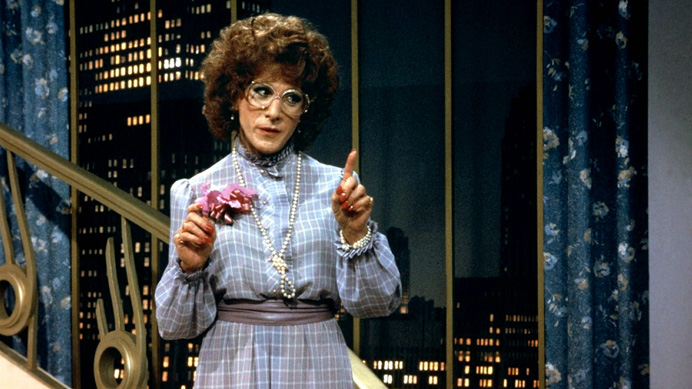
4. Tootsie (1982) | Dir. Sydney Pollack | 116 min.
I have a constant fear that Tootsie is being forgotten. It’s one of those classics that people don’t talk about enough because they’re too busy caring about stark, ‘edgy’ things like Raging Bull or something. Tootsie is where the fun in movies lives. Only a movie could offer such a delightful premise, present it with such honesty, and execute it with such fluid craftsmanship.
Dustin Hoffman is one of those guys that you can say “he’s the best actor of all time” about and nobody really argues—the others being Tom Hanks and Jack Nicholson. And it’s deserved. From Kramer vs Kramer to Outbreak to The Graduate, the guy is batting .300 and Tootsie is no exception—in fact it’s one of his best.
It’s the soundtrack and the touching love story, but really it’s the friendship between Dorothy and Jessica Lange’s character that delivers on the niceness. But who cares about that—if we’re talkin’ Tootsie we gotta mention Bill Murray, also one of the best actors of all time, who was allowed to improv his way to the deliciously pretentious, classic line ”I want my audience to be made up of people who came in out of the rain”.
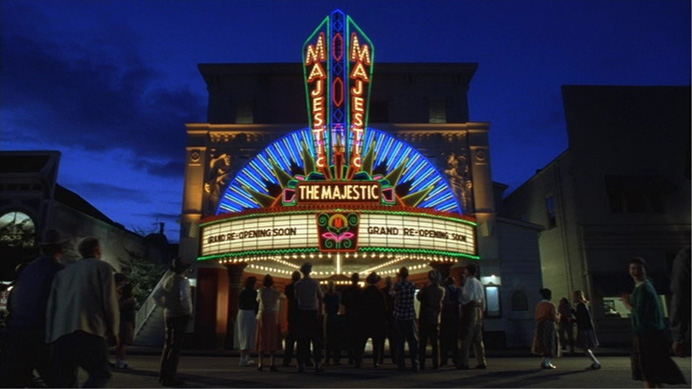
3. The Majestic (2001) | Dir. Frank Darabont | 152 min.
Frank Darabont is amazing. He’s grossly underrated. If you forget about his dollar baby (his 1983 short The Woman in the Room—‘dollar baby’ refers to a series of stories that Stephen King offered to filmmakers for $1) and Buried Alive, you’re left with an immaculate track record containing some of the best movies ever made. Shawshank is practically underrated despite being number one on the IMDb top 250. (Fuck you, Godfather!)
The Majestic is his least talked-about movie, and it’s a shame. It also marks the first true departure for the ever brilliant Jim Carrey, who beautifully anchors the movie, proves he has dramatic chops, and solidifies himself as one of the best movie stars we’ve ever had.
The Majestic is a very classic, movie-esque movie, and not just because it takes place in the McCarthy era 50‘s—the story just looks and feels like something that would be made in the 40’s or 50’s. Thank god it wasn’t. Proper staging, camera work, acting styles, and tone have fostered a modern era where old-style movies can all of a sudden be made the right way.
The Majestic is a movie about community, which is perfect fodder for niceness, because in triumph, it means people will be coming together. But it’s the second act in particular that’s nice central, as Carrey is inundated by niceness in a mysterious town.

2. Stone Reader (2002) | Dir. Mark Moskowitz | 127 min.

1. Doc Hollywood (1991) | Dir. Michael Caton-Jones | 104 min.
The small-town atmosphere helps. And Julie Warner’s smile. And David Ogden Stiers’ fatherly performance. But really, it’s Michael J. Fox’s arc and his ability to suck you in. It’s no wonder they held out for him after having already shot half of Back to the Future with Eric Stoltz as Marty. The guy is the perfect leading man. When he’s being a dick, you know why, and you know with tickling, predictable, movie-esque inevitability that by the end, he’ll be all turned around. Watching him do it is pure joy.
Doc Hollywood is the culmination of all things nice in cinema. The warm and earthy color palette, the pull at-your-heart-strings score, the kooky cast of characters in their home-y setting, and the movie-eque love story. There are not enough synonyms for the word ‘delightful’ to do it justice here.
They say it about a lot of things, to the point that it’s lost all meaning, but they really don’t make movies like this anymore. They don’t make movies like any of the titles on this list, actually. In fact, looking at this list, it’s strange to thin back to a time when movies like these came out. It seems like a distant planet, far out of reach.
A few of the directors on here have recently tried, but their efforts came out inverted and off-kilter. I’m thinking in particular of the notorious missteps We Bought a Zoo from Cameron Crowe and How Do You Know from James L. Brooks. Here’s hoping that one day we see something truly nice from them again.
the writing and homework in Greg’s essay is immortal!